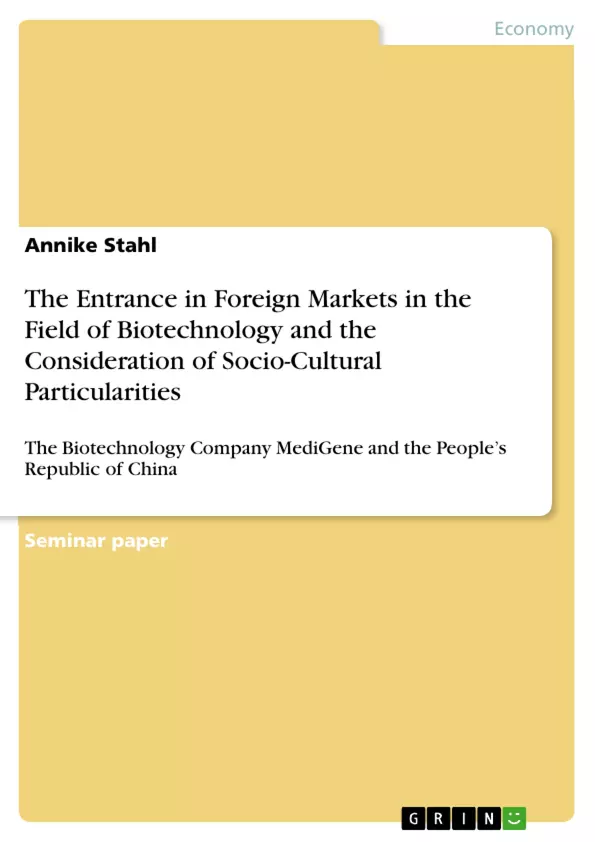For many years now China represents one of the most popular target markets of the internationalisation of enterprises. The speed of economic development and social changes of China during the last years is indeed enormous and far above average.
Today China is already the second largest economic nation and for many years receives the highest foreign investments worldwide. In 2002 China became Germany’s biggest Asian trading partner taking the leadership over from Japan. Additionally 2012 shall be the German-Chinese cultural year.
A comparable rapid change and development can be seen in the field of biotechnology. Over the last few years biotechnology became more and more important, popular and underwent a tremendous boom.
Pharmaceutical industry is a sunrise industry, especially the biopharmaceuticals, which just starts its large-scale industrialization process. Many large biotech and pharmaceutical companies are strengthening their presence worldwide and have already entered the Chinese market - Roche, Novartis, GlaxoSmithKline and Pfizer, to name but a few. Among these as well BASF operates a joint venture together with the Chinese enterprise Sinopec for the production of high-quality chemical products and polymers.
This seminar paper evaluates possible market entry strategies for the small and medium enterprise MediGene AG into China taking account of socio-cultural particularities.
In the second chapter this seminar paper gives an insight into the characteristics of the Chinese culture and the biotechnological market in the People’s Republic of China.
The subsequent third chapter contains information about the products and today’s internationalisation of MediGene.
The fourth chapter is addressed to the different market entry strategies into China, which MediGene could choose.
Finally, the seminar paper comes out with a conclusion and recommendation for MediGene considering the won findings.
Inhaltsverzeichnis (Table of Contents)
- LIST OF ABBREVIATIONS
- 1. INTRODUCTION
- 2. CHINA CHARACTERISTICS OF THE MARKET AND THE CULTURE
- 2.1 SOCIO-CULTURAL PARTICULARITIES OF CHINA
- 2.1.1 The Theory of Hofstede
- 2.1.2 China's Socio-Cultural Particularities in Comparison to Germany
- 2.2 BIOTECHNOLOGY IN CHINA
- 2.2.1 The Development of Biotechnology in China
- 2.2.2 The Acceptance of Biotechnology in China
- 2.3 COUNTERFEITING AND PATENT LAW IN CHINA
- 2.1 SOCIO-CULTURAL PARTICULARITIES OF CHINA
- 3. THE BIOTECHNOLOGY COMPANY MEDIGENE
- 3.1 PRODUCTS AND PATENTS OF MEDIGENE
- 3.2 SERVING THE FOREIGN MARKET
- 4. ENTRANCE OF MEDIGENE INTO THE PEOPLE'S REPUBLIC OF CHINA
- 4.1 MARKET ENTRY STRATEGIES
- 4.2 EVALUATION OF POSSIBLE Market EntrY STRATEGIES FOR MEDIGENE
- 4.2.1 Export
- 4.2.2 Joint Venture
Zielsetzung und Themenschwerpunkte (Objectives and Key Themes)
This seminar paper evaluates possible market entry strategies for the small and medium enterprise MediGene AG into China, considering socio-cultural particularities. The paper provides insights into the characteristics of Chinese culture and the biotechnological market in the People's Republic of China, explores the products and internationalization of MediGene, and analyzes different market entry strategies for MediGene.- Socio-cultural particularities of China
- The development of biotechnology in China
- The acceptance of biotechnology in China
- Market entry strategies for MediGene in China
- Evaluation of export and joint venture strategies for MediGene
Zusammenfassung der Kapitel (Chapter Summaries)
The first chapter provides an introduction to the topic of market entry strategies for biotechnology companies in China, highlighting the rapid economic and social development of China and the growing importance of biotechnology. The second chapter delves into the characteristics of the Chinese market and culture, examining socio-cultural particularities through the lens of Hofstede's cultural dimensions, comparing Chinese and German cultures. It further explores the development and acceptance of biotechnology in China, including considerations of counterfeiting and patent law. The third chapter focuses on the biotechnology company MediGene, presenting information about its products, patents, and current internationalization efforts. Finally, the fourth chapter analyzes different market entry strategies for MediGene in China, specifically examining the export and joint venture models.Schlüsselwörter (Keywords)
The main keywords and topics of this paper include the Chinese market, biotechnology, market entry strategies, socio-cultural particularities, Hofstede's cultural dimensions, MediGene AG, export, and joint venture. The paper explores the implications of these factors for the successful entry of foreign companies into the Chinese biotechnology market.Frequently Asked Questions
Why is China an attractive market for biotechnology companies?
China is the world's second-largest economy and has shown rapid development in the pharmaceutical and biotech sectors, making it a "sunrise industry" with significant investment potential.
Which market entry strategies are evaluated for MediGene AG?
The paper specifically evaluates export strategies and the formation of Joint Ventures as potential ways for MediGene AG to enter the Chinese market.
What role do socio-cultural differences play in entering the Chinese market?
Socio-cultural factors are crucial for business success in China. The paper uses Hofstede's cultural dimensions to compare Chinese and German cultures and highlights specific particularities that influence business relationships.
How is the acceptance of biotechnology in China?
Biotechnology has undergone a tremendous boom in China. The paper explores its development and how the Chinese society and market accept these new technologies compared to Western standards.
What are the challenges regarding patent law in China?
Counterfeiting and intellectual property protection are significant concerns. The paper discusses the current state of patent law in China and its implications for foreign biotech firms like MediGene.
- Citation du texte
- Annike Stahl (Auteur), 2010, The Entrance in Foreign Markets in the Field of Biotechnology and the Consideration of Socio-Cultural Particularities, Munich, GRIN Verlag, https://www.grin.com/document/146877



